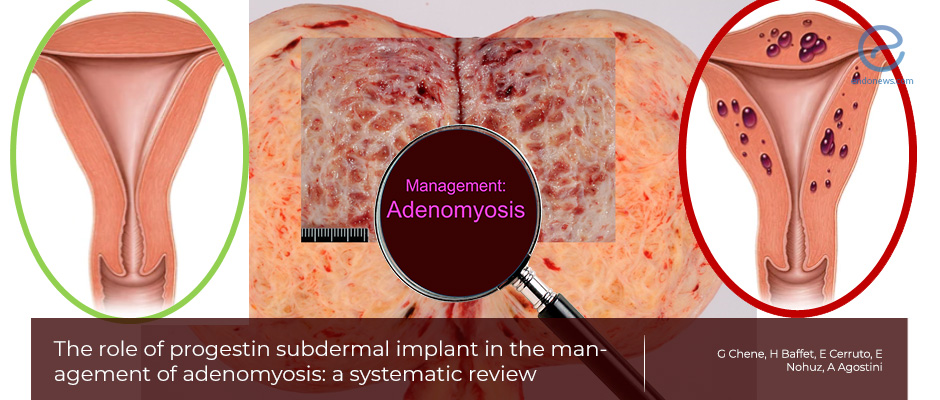A comprehensive review of subdermal progestin in adenomyosis management
Jun 5, 2024
Could subdermal progestin implants be a remedy for adenomyosis patients
Key Points
Highlights:
- Though adenomyosis is regarded as a histopathological form of endometriosis, many aspects have not been revealed.
- Treatment modalities against endometriosis should be studied in women with adenomyosis to assess their effectiveness.
Importance:
- In this regard, the long-acting reversible contraception progestin subdermal implant that ameliorates symptoms of endometriosis in adenomyosis needs to be evaluated.
What's done here:
- The authors have done an extensive electronic search in databases to evaluate the effectiveness of progestin subdermal implants in adenomyosis management.
Main key feature :
- Published scientific data on progestin subdermal implantations seem to be efficient in the management of adenomyosis, however, controlled trials and prospective studies are needed to confirm the potential role in larger patient populations.
Limitations of this review :
- There are no controlled trials comparing progestin subdermal implants to levonorgestrel intrauterine system.
- The small sample size, lack of accurate diagnostic criteria, methodological quality of the included studies, and the absence of larger cohorts are major limitations.
Lay Summary
French academicians from Lyon and Marseilles led by Dr. Chene have published recently an electronic database search on the effectiveness of progestin subdermal implants in adenomyosis patients. This review appeared in the March 2024 issue of “The European Journal of Contraception & Reproductive Health Care”
The long-acting reversible contraception progestin subdermal implant seems to be effective in ameliorating symptoms of endometriosis. Since adenomyosis is regarded as a histopathological form of endometriosis there is a question on the effectiveness of progestin subdermal implants in this ailment also.
The authors have done an extensive electronic search in databases, using combinations of the following keywords: Progestin; subdermal implant; Implanon; Nexplanon; Adenomyosis; and Endometriosis.
The initial database search revealed 889 manuscripts, however merely 5 prospective observational studies were eligible for inclusion in this review. This review revealed 152 participants that have experienced significant reductions in pelvic pain besides painful menstruations.
Additionally, a rise in hemoglobin values following implantations (from 86g/L to 129g/L) was observed. It is worth emphasizing that these benefits may be observed throughout the long-term clinical follow-up (until 36 months). Changes in the bleeding patterns were tolerable in most patients during these applications.
The long-acting reversible contraception progestin subdermal implant seems to be effective in reducing pelvic pain besides improving the quality of life in women suffering from adenomyosis. However, controlled trials and prospective studies are needed to confirm the potential role of this mode of treatment in larger patient populations.
The lack of randomized controlled trials comparing subdermal implant to levonorgestrel intrauterine system, the small sample size, the lack of accurate diagnostic criteria for adenomyosis, the methodological quality of the included studies, and the absence of larger cohorts seem to be the major limitations of this review.
Research Source: https://pubmed.ncbi.nlm.nih.gov/38426337/
adenomyosis progestin subdermal implant endometriosis etonogestrel pelvic pain

